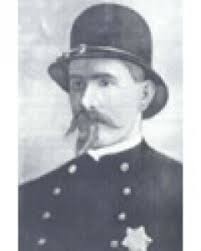The last time that American Pastimes featured the history of the folk song “Duncan & Brady” was in February, 2014 – in the wake of the Ferguson, Missouri unrest that stemmed from the shooting death of an African-American man by local police. “Duncan & Brady” aka “Been on the Job Too Long” is an often-told story that can be traced back to October, 1880 in St. Louis, Missouri. Sadly, in light of our nation's social ills, it's still relevant today.
Newspaper reports
and court records tell the story of Patrolman James Brady who was shot and
killed while responding to a barroom brawl at the Charles Starkes Saloon in the
red-light district of St. Louis, Missouri.
Harry Duncan, an African-American boot-black, porter and actor/singer, was
arrested and convicted of the crime. The
killing escalated the existing racial tensions within the southern city and
violence erupted. Sentenced to hang, Duncan
fought the decision with a series of appeals that took the case all the way to
the United States Supreme Court. His attorney, Walter Moran Farmer presented his
case before the Court. It was the first
time that an African-American attorney argued a case before the Supreme Court.
The appeal was denied and Duncan
was executed by hanging in July 1894. Up until the end Duncan continued to claim that saloon owner Starkes
was the killer.
Probably within
weeks of the shooting, local musicians were singing about the event, and the evolution
of the folktale began. It doesn’t seem unreasonable to assume that initial
versions of the song placed the story within the context of ongoing police harassment
of African-Americans in a southern city.
But as the song found its way to different communities and musicians, it
took on new features, specifics, and meaning.
With each
rendition Duncan’s occupation shifted; from bartender to gambler to grocery
owner to lineman. For the most part,
Brady always remained a police officer and in its most popular widespread
versions the song remained a simple matter of good riddance to a bad cop. This
is evident in the earliest versions collected in the south by Dorothy Scarborough
for her 1925 book On the Trail of Negro Folk-Songs and in the north by Carl Sandburg for his 1927 book American Songbag:
“Duncan and his brother was playin’ pool
when in comes Brady actin' the fool." (from Scarborough)
“Brady Brady where you at?
Struttin’ in hell
with his Stetson hat.” (from Sandburg)
Although there is no documentary evidence that Officer Brady
was a corrupt cop, the relations between St. Louis police and the
African-American community was at its worst as the Reconstruction Era tightened
its racist grip on southern states. As the legal civil rights of African-American
citizens were being systematically rescinded it was the local police departments
that were on the front lines of the war on their civil rights. And so Brady the
policeman, in most versions of the song, remains a very unsympathetic
character, even in death. His bad nature is often reinforced by the response of
other secondary characters to his death.
Music collector Paul Clayton discovered this verse about the
doctor who ministered to him, and his opinion of the officer:
“Brady, Brady, was a
big fat man;
The doctor caught a hold of Sheriff Brady's hand,
Felt for the pulse and then he said,
I believe to my soul Sheriff Brady is dead.
Been on the job too
long.”
In some versions even Mrs. Brady’s reaction is presented
with ambivalence. When told of her husband’s
demise:
“She up and started
singing his mourning song.
Runnin’ round town, and crying up and down
In an old Mother Hubbard and a blue night-gown
SHE’D been on the job
too long.”
In yet another version, Mrs. Brady takes the news of his
death with tepid calmness, remarking to their children, "We’ll all draw a pension when your daddy dies." In that
version it’s only the prostitutes who react with real emotion to his demise:
"Shufflin' up the
street
In they sweet little shimmies
And they black-stockin' feet.
Been OFF the job too
long.”
Brady's premature retirement at the hands of Duncan had
allowed the working girls to return to their livelihood.
In 1929, almost fifty years after Officer Brady died, the earliest
known recording of the story was made by Wilmer Watts & the
Lonely Eagles. Not much is known about Watts
other than he was a white man from the North Carolina Piedmont region. Some of his other songs, such as “Cotton
Mill Blues” suggest that he worked the cotton mills. His version is called “Been
on the Job Too Long” and it reverses the names and roles: Duncan is the
sheriff and Brady a working man; a telephone lineman who “had been on the
job too long” and gets killed by the sheriff. Watts
may have been subtly commenting on local labor troubles which were common in the
Piedmont during the early 20th
century as mill owners used the local police to fight the union organizers. In
subsequent recorded versions (usually titled “Been on the Job Too Long”), the
focus of the song sometimes evolves further away from the original storyline, and turns toward other occupations, issues or personal grievances, but the interaction between the sheriff and working man always ends poorly for the sheriff.
There are hundreds of recorded versions of this story. The most recent versions have all been primarily inspired by the field recordings of John Lomax which include those of prison convicts, Blind Jesse Harris and Leadbelly, all of which adhere closely to the original storyline. As accurate recollections of a historic event, most fail. But as reflections of the human experience and the social conditions throughout America in the 19th and early 20th century they more than succeed, and unfortunately remain especially pertinent today.
For more detailed information: John Russell David's Ph.D. dissertation "Tragedy in Ragtime: Black Folktales from St. Louis" (St. Louis University, 1976); the Mudcat Cafe folk music website (mudcat.org); and http://www.mywire.com/a/African-American-National-Biography-HarryDuncan.











